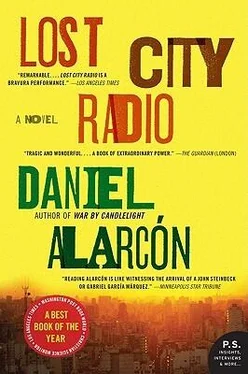THE PERSON Norma missed most of all in Rey’s absence was not Rey but the person she had been when she was with him. The roadblock brought it all back: there was a part of her — not a small part — that had been seduced at the exact moment the soldier pulled Rey off the bus so many years ago. She had become in her time with Rey a woman who lived alongside that danger, who, in one way or another, conquered fear in order to be with the man she loved. Because what did she remember from her years with Rey? Not the sword that hung over them, not the tension, the suspicions, but the laughter, the joking, walking down the street hand in hand, the happiness that existed in spite of everything else. The world collapsed around them, and still they stood together, imperturbable, calm; it was the relationship they had made, pliant and modern; the alchemy that happened when they turned out the lights, when they folded their bodies into each other and felt no shame.
She had to remind herself sometimes, because it was easy to forget: Rey had wanted her.
The road up from the beach was lit brightly, the bluffs on either side shining with a white fluorescence. The car rolled slowly to a stop, and there it was again: the point of a rifle insinuating itself into her life. Rey, she thought. She very nearly said it out loud. This was all routine. She looked straight ahead and not at the rifle to her left. There were two staggered rows of stones and razor wire lying across the road. To one side, a soldier, a boy about five years older than Victor, stood warming himself by a fire.
“Out,” the rifle ordered. If there was a body attached to the weapon, Norma decided not to notice it.
Already Manau was outside. She roused the boy, and a moment later, she was there, too, with Victor by her side, half-asleep. She held her hands over her head and faced the car the way she’d seen criminals do in movies. The boy-soldier demanded papers, identification, and she felt faint.
The jungle, Rey had told her many times, was a pharmacological paradise. Uncharted and unclaimed, the cures to all the world’s diseases were there, hidden, waiting to be found. It would take a generation or more to discover the gifts it held, if they didn’t disappear first. One of the war’s many unintended consequences — one of its only positive ones — was that it had rendered the jungle relatively inaccessible, therefore slowing the pace of its destruction. People fled the jungle. It was only a matter of time, Rey had said, until they fled to it: when the cities became too crowded, too choked with smoke and noise, when peace came and allowed them once again the freedom to roam within the borders of the nation-state.
“Can’t I come with you?” she’d asked him once.
“Of course. Once the war is over.”
She’d laughed then: “Silly, this war won’t ever end.”
Rey brought back stories of drugs that cured all kinds of ills, showed her the careful notes he took. The very nation might be saved by the forest: there might be a plant for every kind of miracle. “They have plants for potency,” he told her once, as he pulled her into the apartment and onto the couch. “Not that I need them.” That day, he still smelled of travel, of buses and smoke and places she had never visited. “Who have you been with while I was gone? Tell me, make me jealous…”
“A whole city of men wakes up with me whispering in their ears.”
“Stop.”
“It’s true,” she said, biting her lip, and already his hands were under her clothes, her body tingling. She was cold and hot all at once. Looking over Rey’s shoulder, she saw the door was open. He had closed it with his foot in his hurry to take her into his arms, and the lock hadn’t caught. Their neighbor’s ten-year-old son stood in the doorway, watching. He was wide-eyed and curious, just a child. “Rey,” Norma whispered, but he wasn’t listening. She felt she should shoo the child away, but then she didn’t care. They were behind the couch, and he couldn’t see anything. So she closed her eyes and imagined they were alone. It wasn’t hard to do. The war had always been with them, and she was accustomed to pretending.
“Hands up,” the rifle barked. He stepped to Manau and patted him down. He took Manau’s wallet out and flipped through it. He seemed disappointed by its contents. He held Manau’s ID up to the light. “This is fake.”
“It’s not fake,” Manau said. “Who has fakes?”
“Shut up.”
“Norma, tell them.”
“I said shut up.”
“Norma.”
It was cold, and her body stiffened. She turned to Manau and glared. Tell them what? These people didn’t want to hear her stories, they didn’t want to know of her disappointments.
“Where are you going?”
“The radio,” Manau said. “ Norma .”
“Who’s Norma? Which Norma?”
“ Norma Norma.”
For a moment, the rifle seemed to consider this possibility. With the end of the weapon pointed downwards, he told Norma to turn around. She did, and he examined her in the harsh, white light. He seemed suddenly nervous. “You’re Norma? You don’t look like Norma.”
“But have you ever seen her?” Manau said.
The rifle was raised suddenly to eye level, Manau pushed roughly against the car, the end of the weapon at his temple: “Are you ever going to shut up?”
“Please, not in front of the boy. It’s me. Really. It’s me.”
“They’ll all love you,” Elmer had said when it began. But how had he said it? With his head shaking and his lips pressed into a tight, disbelieving frown. “It’s that voice you have…” Norma had felt the unpleasant sensation of being pitied. And then Rey disappeared, and she’d felt it every day since: Rey’s absence clinging to her like some contagion. Elmer had been right, of course: they did love her. For years, she’d received perfumed letters full of names, modest gifts wrapped in newsprint. At the station, there were a half-dozen shoeboxes full of photographs with scalloped edges, each with an inscription noting which of the smiling faces in the picture might still be alive. And this was it: might be . This not knowing, this exhaustion — you could hear it in every voice that called, see it in the careful script of every letter. It was mercy they sought: an answer, a yes or a no to release them from the burdens of waiting and hoping and wondering. It was what she heard in the soldier’s voice, too: something unexpectedly timid, something afraid.
“I don’t believe you,” the soldier said. He still held the gun to Manau’s head. “You think I’m stupid.”
“No, no,” Norma said, “no one said—”
“Let me hear you.”
It was, in the end, what she was good at: being heard. She should have been a poet or a preacher. A hypnotist, a politician, a singer. Norma took a deep breath.
“Talk!” the soldier yelled, and she did.
“This evening,” Norma purred, “on Lost City Radio: from the jungle comes a boy…”
The soldier’s face became very serious. “Names. I want to hear names.”
“Names?” she asked, and the soldier nodded. She took the list from her pocket, and she gave him names. Which ones?
All of them. All of them, except one.
When she saw that he had heard enough, when he lowered the rifle and smiled with recognition, only then did she stop.
With great ceremony, the young man took the weapon with his left hand and pointed it upwards, the barrel against his shoulder. He kicked his boots together and, with his right hand, gave Norma a military salute.
“It’s an honor, Miss Norma.”
She blushed. “That’s really not necessary,” but already the other soldier had come and offered his salute as well. “We listen every week,” he said.
Читать дальше












